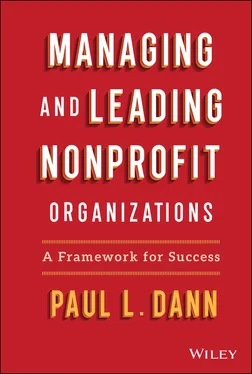Paul L. Dann - Managing and Leading Nonprofit Organizations
Здесь есть возможность читать онлайн «Paul L. Dann - Managing and Leading Nonprofit Organizations» — ознакомительный отрывок электронной книги совершенно бесплатно, а после прочтения отрывка купить полную версию. В некоторых случаях можно слушать аудио, скачать через торрент в формате fb2 и присутствует краткое содержание. Жанр: unrecognised, на английском языке. Описание произведения, (предисловие) а так же отзывы посетителей доступны на портале библиотеки ЛибКат.
- Название:Managing and Leading Nonprofit Organizations
- Автор:
- Жанр:
- Год:неизвестен
- ISBN:нет данных
- Рейтинг книги:4 / 5. Голосов: 1
-
Избранное:Добавить в избранное
- Отзывы:
-
Ваша оценка:
- 80
- 1
- 2
- 3
- 4
- 5
Managing and Leading Nonprofit Organizations: краткое содержание, описание и аннотация
Предлагаем к чтению аннотацию, описание, краткое содержание или предисловие (зависит от того, что написал сам автор книги «Managing and Leading Nonprofit Organizations»). Если вы не нашли необходимую информацию о книге — напишите в комментариях, мы постараемся отыскать её.
Managing and Leading Nonprofit Organizations: A Framework For Success
Managing and Leading Nonprofit Organizations: A Framework For Success
Managing and Leading Nonprofit Organizations — читать онлайн ознакомительный отрывок
Ниже представлен текст книги, разбитый по страницам. Система сохранения места последней прочитанной страницы, позволяет с удобством читать онлайн бесплатно книгу «Managing and Leading Nonprofit Organizations», без необходимости каждый раз заново искать на чём Вы остановились. Поставьте закладку, и сможете в любой момент перейти на страницу, на которой закончили чтение.
Интервал:
Закладка:
In 1854 Louis Pasteur was credited with saying that chance visits only the prepared mind. This astute comment, which was directed at the process of making observations within the realm of the natural sciences, aligns beautifully with an important perspective to hold within your leadership practice. By working to prepare yourself for possibilities you are ready to see the potential that exists and as a result seize a serendipitous moment. Good things happen when you prepare yourself for the possibilities. When we limit our view of the opportunity, we in turn shut ourselves off from the opportunity that appears.
Be sure to work at having a prepared mind!
Fifth Practice Perspective: Use a Compass, Not a Road Map
This fifth perspective comes to us with its share of simplexity. As you work to build your practice be sure that your strategies to develop yourself, your team, and your organization reflect an approach that is more directional in nature than it is hard and fast. Keeping your eye on the direction you hope to move in while avoiding the rigidity represented in a hard‐and‐fast, road map–based approach will become invaluable as you work to advance leadership practice. It is essential that you understand where you desire to be and what your vision is, yet be sure to remain flexible and adaptive as you encounter the many challenges and obstacles along the journey.
The trick here is to keep working toward the leadership vision that you have while building out just enough of the road map to remain flexible so that you can adapt to any twists and turns along the road. In many ways this is akin to the third practice perspective where you pay attention to the journey as well as the fourth practice perspective where the way you pay attention leaves you open to the possibilities that will present themselves.
In my work with developing leaders, I have seen times when they have become so committed to a particular path that their capacity to pivot has been hamstrung. It is fine to have a plan, but do not forget that the plan you develop is there to serve you. You should not feel that you must serve the plan. If the section of road that you have laid out is not working, then pay attention instead to the direction that you wish to pursue and feel free to change course. Remember, with a compass you will reach your destination, even if you get lost temporarily. Road maps, conversely, have limited utility, they become outdated, and there are plenty of opportunities to end up on a cul‐de‐sac.
Sixth Practice Perspective: Awareness
As a leader it is essential that you work to develop your own capacity for self‐awareness. Awareness, however, can be a funny thing. Most people believe that they possess a high degree of self‐awareness. Generally, the realization that one is lacking in awareness comes when someone points it out (and even then, we often resist taking this input) or in an instance when the individual is caught unaware. In a way awareness is like getting out on the ice in the winter. First you look to see if the ice seems thick enough and once you have determined it is “all good,” then you venture out to the center of the pond. It is only when you start to hear the sound of cracking ice that you suddenly realize that you are in serious trouble and you've been caught unaware. You turn and run as quickly as possible, hoping and praying that you do not fall through.
Given the sometimes‐allusive nature of awareness it is especially important to continually work to refine your own self‐awareness as well as the awareness held by your team members. Meta‐thinking is one way to help advance your own awareness. Meta‐thinking is in effect thinking about thinking. Take time to consider what you are thinking and feeling and how your thoughts and feelings are connected to support or alternatively take away from the leadership practice you hope to develop.
Awareness can also be developed through effective feedback processes with colleagues, supervisors, and individuals whom you trust. Having the ability to seek and receive feedback provides a growing opportunity for you to expand your self‐awareness. The best feedback is feedback that is solicited (you have asked for it), based on observation (about your work and/or performance), and nonjudgmental. It is also based on something that the receiver can do something about, it is checked for accuracy, and it is delivered in a way that is both timely and yet sensitive to the when and where. Giving feedback to someone in a large meeting about their performance is clearly less effective than providing the individual with the same information in a one‐on‐one meeting. Similarly, providing feedback in close proximity to the precipitating event or situation is more effective than putting it off.
Giving and receiving feedback can be challenging as it often requires that we work in an antigravitational way. Our culture often says “Forget about it” even though we know that feedback, when it is done well, will help the individual to develop their skills and capabilities. It is important to resist the temptation to put off providing feedback, or worse, to skip it because you have decided it is not worth the hassle. When you avoid feedback, you will soon see that things can go from bad to worse. Think for example of the splinter you have put off removing. It does not take long before you risk infection.
Seventh Practice Perspective: Address Inner Pressures
As you work to develop your self‐awareness it is important to consider how your growing awareness connects to your inner self. From a psychoanalytic perspective we have thoughts and feelings as well as ideas about who we are in the world and how we should be, which all play a role in our leadership practice. If, for example, you believe that you must have things done right and done well 100 percent of the time, then your leadership will manifest itself in a manner that pursues perfection. Similarly, if you feel that you will never get it right, your capacity to develop a balanced sense of confidence will be hampered and your leadership practice will be adversely impacted.
Understanding your inner pressures and how to manage them successfully will help you to advance in your leadership ability. For example, my upbringing was within a White Anglo‐Saxon Protestant family. Emotions were shared, but we largely adhered to the tradition in which one kept a “stiff upper lip.” Angry and upset feelings were frowned upon. This seems innocuous enough, but let me tell you that as a leader I have had to learn how the internal pressure I experienced to avoid situations where people became emotional impacted my leadership practice. As my self‐awareness grew, I began to realize that I would avoid confrontation or difficult situations simply because I found it intolerable to have people upset.
Ways to address your inner pressures start with first becoming aware that they exist. What types of inner pressure do you experience? Once you have taken stock and feel you know what they are, you can begin a process of addressing them. Sometimes this is as simple as being aware that you experience them and other times it may require that you develop a specific strategy to address the issue. In my case I had to practice managing the feelings that come with the expression of emotion by simply sitting rather than jumping into action to fix the situation. Trust me, as a strategy this was extremely hard, but in time I learned that holding fast rather than reacting would allow those involved to express themselves, they would feel heard, and the highly charged emotions would ultimately pass so that we might move the effort forward.
Another strategy that you can and should pursue is the use of supervision to help you work through the challenges that are presented vis‐à‐vis the inner pressures. Effective supervision can be critical in the development of any and all leadership strategies and is particularly helpful when you are working to address inner pressures. The key is to have a strong supervisor, something that is not always a readily apparent option. When this is not an option, I recommend finding a trusted individual to serve as a mentor for your leadership practice journey (see the section on finding a mentor later in this chapter).
Читать дальшеИнтервал:
Закладка:
Похожие книги на «Managing and Leading Nonprofit Organizations»
Представляем Вашему вниманию похожие книги на «Managing and Leading Nonprofit Organizations» списком для выбора. Мы отобрали схожую по названию и смыслу литературу в надежде предоставить читателям больше вариантов отыскать новые, интересные, ещё непрочитанные произведения.
Обсуждение, отзывы о книге «Managing and Leading Nonprofit Organizations» и просто собственные мнения читателей. Оставьте ваши комментарии, напишите, что Вы думаете о произведении, его смысле или главных героях. Укажите что конкретно понравилось, а что нет, и почему Вы так считаете.











